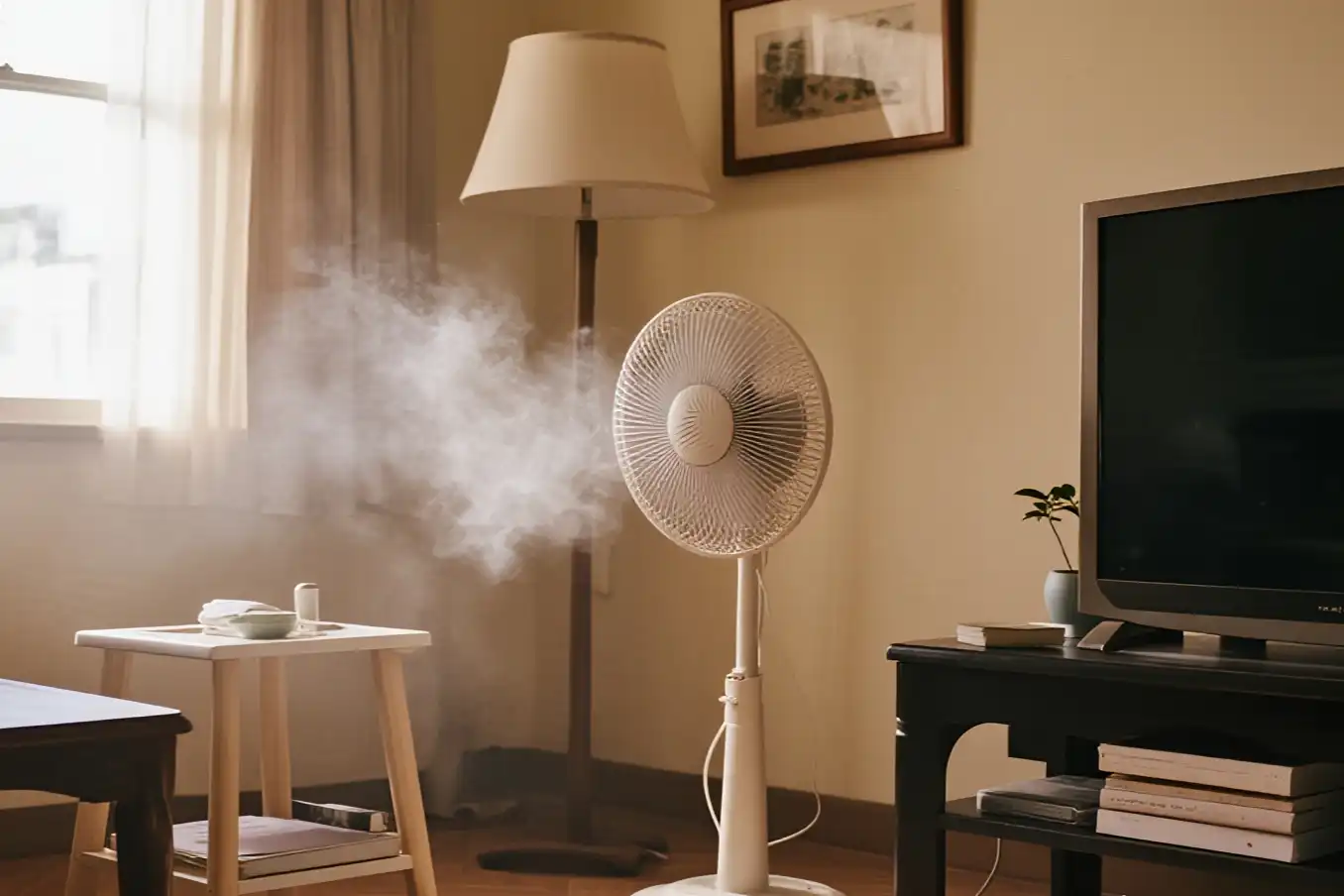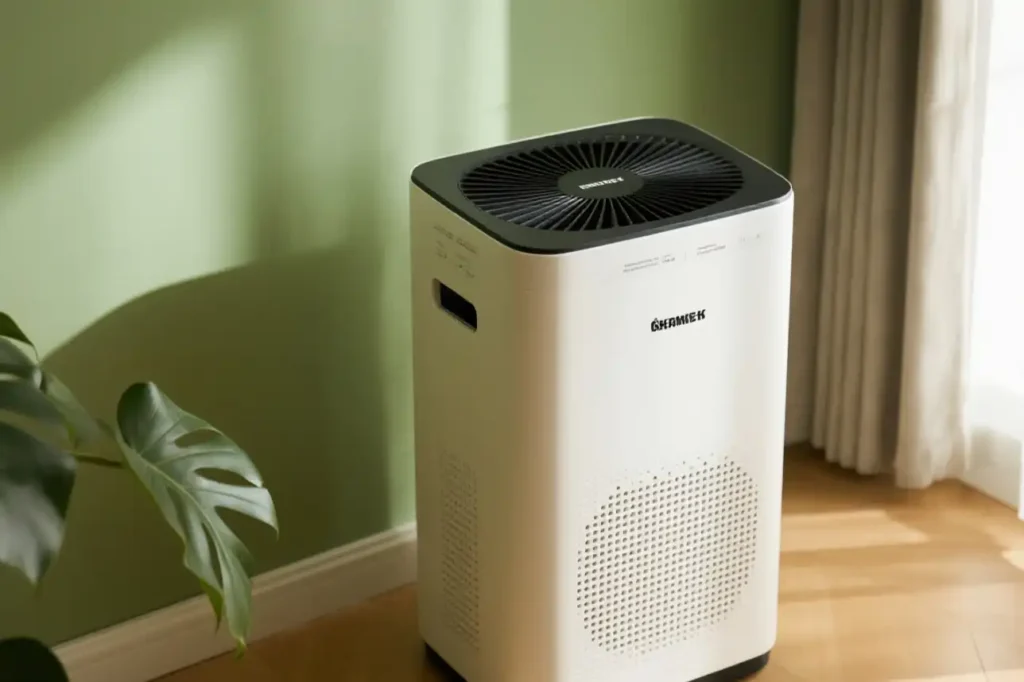
You walk inside on a hot day and notice the air feels heavy and stuffy. Summer air quality often drops because heat and humidity let mold and dust thrive indoors. You might run your air conditioner more, but it can dry out the air and move dust or mold around if not cleaned. Even small changes, like cleaning air ducts or watching your indoor humidity, help you breathe easier and feel more comfortable.
Key Takeaways
- High summer humidity makes indoor air feel heavy. It helps mold and dust mites grow. These can cause health problems.
- Poor ventilation keeps moisture and pollutants inside. This increases allergens and makes the air feel stale.
- Use dehumidifiers to lower indoor humidity. Keep humidity between 30% and 50%. This stops mold and dust mites from growing.
- Clean and change air conditioner filters often. This helps reduce dust, mold, and harmful chemicals in the air.
- Open windows when the outdoor air is clean. Use exhaust fans to bring in fresh air. This helps improve ventilation.
Summer Air Quality Changes
Humidity and Dampness
In summer, the air inside can feel sticky and heavy. High humidity makes it tough for your air conditioner to cool rooms. Extra moisture helps mold, mildew, and dust mites grow. These can make you sneeze, cough, or have asthma attacks. If humidity goes over 60%, you might smell musty odors or see damp spots on walls. Your body has trouble cooling off because sweat does not dry fast in humid air. You may feel tired, get headaches, or have itchy skin.
Tip: Keep indoor humidity between 30% and 50% for comfort and health. Use dehumidifiers, exhaust fans, and keep your AC clean to control moisture.
- High humidity:
- Makes cooling harder
- Helps mold and dust mites grow
- Causes stuffy air and health issues
Poor Ventilation
You often keep windows and doors closed to stay cool in summer. This traps moisture and pollutants inside your home. Poor ventilation lets mold and dust mites grow more. You breathe in more allergens and may cough or sneeze more. Stale air can make you feel tired and uncomfortable.
- Poor ventilation:
- Raises allergens and pollutants
- Increases risk of asthma and infections
- Stops fresh air from coming in
Open windows when outside air is clean to let in fresh air. Exhaust fans and good ventilation systems help lower indoor pollutants.
Note: Good ventilation cuts down mold, dust mites, and other pollutants, making summer air better.
Pollutants and VOCs
Indoor air gets worse in summer when pollutants build up. Warm air makes more volatile organic compounds (VOCs) come out of paints, furniture, and cleaners. You might also notice more pollen and wildfire smoke inside. Air conditioners can spread dust, mold, and bacteria if not cleaned often.
| Source Category | Specific Pollutants/Factors | Summer Impact/Notes |
|---|---|---|
| Building Materials | Formaldehyde, VOCs from insulation, carpets, furniture | More VOCs are released indoors in summer |
| Household Appliances | Gas stoves (NO2, CO) | Pollutants build up inside without good airflow |
| Ventilation & AC Systems | Poor ventilation traps pollutants; dirty AC circulates allergens | Makes pollutant buildup worse in summer |
| Biological Contaminants | Mold, bacteria, dust mites | Grow more in humid summer air, raising allergens |
You can lower VOCs and allergens by using good filters, cleaning HVAC systems, and picking low-VOC products.
Tip: Change air filters often and clean AC units to keep summer air healthy.
Health and Comfort Risks
Allergies and Asthma
Summer brings more things that can make you sneeze. You might have itchy eyes or trouble breathing. Mold and dust mites grow faster when it is hot and humid. This can make asthma and allergies worse. Pollen comes inside and mixes with dust and mold. If you have asthma, you may wheeze or feel short of breath. Even people without allergies can feel tired or get headaches from bad air.
- Common triggers in summer:
- Mold and dust mites grow in humid air
- Pollen levels go up and get inside homes
- Air conditioners spread dust and mold if not cleaned
- Ozone and other pollutants bother your lungs
Tip: Use air purifiers, keep humidity under 50%, and check the Air Quality Index (AQI) to help with symptoms.
Stale and Heavy Air
Stale or heavy air can make you feel sick or uncomfortable. Bad ventilation lets pollutants build up inside. You might smell strange odors or feel better outside. Stale air can cause many problems:
| Symptom | Possible Cause |
|---|---|
| Headache | Bad ventilation, indoor pollutants |
| Eye irritation | Dust, mold, organic vapors |
| Fatigue | Not enough fresh air |
| Dry throat | Stagnant air, organic vapors |
| Sinus congestion | Mold, dust mites |
| Dizziness | Pollutants, poor air circulation |
| Coughing | Mold, dust, allergens |
If you notice these problems, open windows when the air outside is clean or use exhaust fans to bring in fresh air.
Mold and Dust Mites
Warm, wet summer air helps mold and dust mites grow. These tiny things multiply fast when humidity is above 60%. You often find them in beds, carpets, and bathrooms. Mold can show up in just one or two days on wet surfaces. Mold and dust mites can make you sneeze, have a runny nose, itchy eyes, skin rashes, or cough. People with asthma or allergies may have more attacks in summer.
- Mold and dust mite facts:
- They grow most in summer, especially in homes with bad ventilation
- Mold can harm walls and furniture
- Dust mites live in beds and carpets
- Keeping humidity under 50% helps stop their growth
Clean often, use dehumidifiers, and make sure your home has good ventilation to protect your health in summer.
Improving Indoor Air

Dehumidifiers and Humidity Control
You can lower humidity to help you feel better in summer. When humidity is high, your house feels sticky. Mold and dust mites grow faster in wet air. Dehumidifiers take extra water out of the air. Try to keep humidity between 30% and 50%. This stops mold and dust mites and helps you breathe well.
Check humidity every week when it is hot. If the air feels clammy or smells musty, you may need a dehumidifier. Whole-home dehumidifiers work with your HVAC system all day. Portable ones help in small rooms like basements or bathrooms.
Dehumidifiers also help your air conditioner work less. This saves energy and money.
Tip: Use exhaust fans in kitchens and bathrooms to get rid of moisture.
- Benefits of humidity control:
- Stops mold and mildew
- Helps with allergies and asthma
- Keeps furniture and electronics safe
- Makes your home smell and feel fresh
Air Conditioning and Filtration
Your air conditioner cools the air and cleans it too. It helps remove dust, pollen, and other things from the air. Clean filters are important for good air in summer.
Pick air filters with a MERV rating of 8 or higher. HEPA filters are best for people with allergies. They catch tiny things like pollen and mold spores. Pleated filters work well and do not cost too much. Activated carbon filters help with smells and VOCs, which are common in summer.
Change or clean filters every 1 to 3 months. If you have pets or allergies, check filters every 30 days.
Here is a table that shows filter types and what they do:
| Air Filter Type | Best For | Replacement Frequency |
|---|---|---|
| Fiberglass | Dust, large particles | Every 30 days |
| Pleated | Dust, pollen, pet dander | Every 3 months |
| Electrostatic | Pollen, pet dander, odors | Clean every 30 days |
| HEPA | Mold spores, fine allergens | Up to 1 year |
| Activated Carbon | Odors, VOCs | Varies, check monthly |
Note: Take care of your HVAC system to keep air clean and help it work well.
- Steps for better filtration:
- Pick high-efficiency filters (MERV 8+)
- Change filters often
- Use air purifiers with HEPA filters in bedrooms and living rooms
- Get your HVAC checked
Ventilation Tips
Good ventilation brings in fresh air and pushes out old air. Open windows and doors early in the morning or late at night when the air outside is clean and cool.
Use exhaust fans in kitchens and bathrooms to get rid of heat and wetness. Whole-house fans help move fresh air in and hot air out.
Check the outdoor Air Quality Index (AQI). Keep windows shut when AQI is high or pollen is bad. Allergy screens on windows block pollen and dust but let air in.
Mechanical ventilation systems, like Energy Recovery Ventilators (ERVs), swap old indoor air with clean outdoor air.
Tip: Cross ventilation works best if you open windows on opposite sides of your house.
- Best practices for summer ventilation:
- Ventilate when it is cool outside (morning/evening)
- Use fans to move air around
- Keep windows shut when it is hot or air is dirty
- Clean and take care of ventilation fans
Cleaning and Maintenance
Cleaning often keeps dust and allergens low. Vacuum carpets and floors with a HEPA vacuum to catch dust and pet hair. Dust surfaces with microfiber cloths to grab tiny bits. Mop floors often to clean up settled dust.
Wash bedding every week in hot water to kill dust mites. Bathe pets weekly and keep them out of bedrooms to lower pet hair.
Change HVAC filters every 1 to 3 months, or more if you have pets or allergies.
Pick cleaning products and paints with low VOCs to lower chemicals in the air.
Add houseplants like spider plants or peace lilies to help clean the air.
Tip: Take off shoes at the door to keep dirt and pollen out.
- Cleaning checklist for better summer air quality:
- Vacuum and mop floors often
- Dust with microfiber cloths
- Wash bedding every week
- Bathe pets and keep some rooms pet-free
- Use air purifiers in busy rooms
- Pick low-VOC products
- Keep humidity between 30% and 50%
Small changes in your daily routine can make summer air much better. You will breathe easier and feel more comfortable if you follow these steps.
Summer air can cause many problems in your home. Pollutants get trapped inside and humidity goes up. Allergens also increase during hot months. These things can make it hard to breathe. You might get headaches or feel tired. You can use air purifiers to help clean the air. Keeping humidity low also helps you feel better. Change your HVAC filters often for cleaner air. Small changes like these protect your health. You will enjoy fresher air at home. Every step you take helps you feel good for a long time. 🌱
FAQ
How often should you change your air conditioner filter in summer?
You should check your filter every month in summer. Replace it every 1 to 3 months. If you have pets or allergies, change it more often. Clean filters help your air stay fresh and healthy.
Can houseplants really improve indoor air quality?
Some houseplants can help remove small amounts of toxins from the air. You should not rely on plants alone. Use them with other methods like cleaning and good ventilation for best results.
What is the best humidity level for your home in summer?
Keep indoor humidity between 30% and 50%. This range helps stop mold and dust mites. Use a dehumidifier or air conditioner to control moisture. Check humidity with a simple meter.
Is it safe to open windows during summer?
Open windows when outdoor air is clean and cool. Check the Air Quality Index (AQI) first. Close windows if pollen, smoke, or pollution levels are high. Use fans or air purifiers when you cannot open windows.
See also
How to Find Air Purifiers That Meet American Certification Requirements
What Building Materials in Your House Release Formaldehyde
How to Find the Best Air Purifier OEM Factory for Your Brand
What to Know About OEM Air Purifier Manufacturing for Businesses
